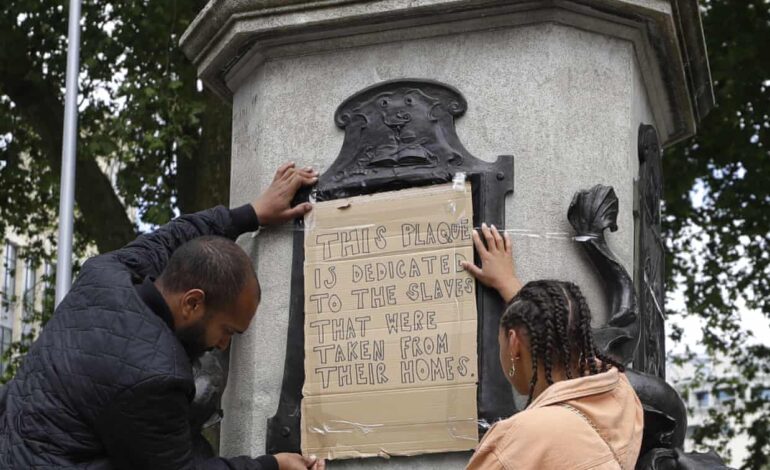Addressing Reparations: The Push for Justice in the UK

As Black History Month unfolds in the UK, discussions around reparations for transatlantic enslavement remain contentious and often unresolved. The topic has resurfaced as a key issue, particularly following Keir Starmer’s recent visit to the Pacific island nation of Tuvalu. While seeking to strengthen Commonwealth ties, Starmer faced calls for justice regarding historical injustices. His response that reparations were “not on the agenda” reflects a recurring sentiment among political leaders when confronted with demands for redress.
Debate on Historical Injustices
Last year’s visit by Starmer marked a significant moment, as he became the first sitting British prime minister to engage with a Pacific nation. The visit’s focus shifted dramatically from anticipated diplomatic discussions to urgent pleas for reparations from those whose ancestors suffered due to transatlantic slavery. This incident illustrates a broader disconnect in public discourse, where the complexities of reparative justice are often overshadowed by myths and misunderstandings.
To gain insight into the reparations debate, I spoke with Kojo Koram, a lecturer at the School of Law at Birkbeck, University of London. He emphasizes the pressing need for a more nuanced conversation about reparations that transcends mere financial compensation. “When discussing reparative justice, we are addressing the need to restructure global power dynamics that continue to perpetuate inequality,” Koram stated.
Historical Context and Current Demands
The push for reparations gained significant traction during the racial reckoning of 2020, which saw protests across more than 260 towns and cities in the UK. At the forefront of these demonstrations was a demand for acknowledgment of Britain’s role in slavery and the need for reparative measures. Despite this momentum, the UK government has yet to issue a formal apology for slavery; the closest being Tony Blair’s expression of “deep sorrow” in 2006, which many Caribbean nations did not accept as an official apology.
Some British institutions have taken steps towards reparative justice. Notably, the Bank of England issued an apology, while organizations such as Lloyd’s of London and the Church of England have committed to reparations. Yet, this initial progress was met with backlash, leading to a stagnation in the reparations movement.
A recent report from the Runnymede Trust has reignited discussions about reparations, revealing that the UK could owe approximately $24 trillion (£18.8 trillion) in reparations across 14 countries. The staggering figures often lead to dismissal of reparations as unrealistic, yet Koram argues that Britain has historically paid reparations, albeit to enslavers rather than the enslaved. “When slavery was abolished, the British government borrowed £20 million to compensate enslavers, a sum that represented 40% of the Treasury’s annual income at that time, amounting to around £450 billion today,” he explained.
As discussions about reparative justice continue, the political landscape remains resistant. Starmer has redirected attention to contemporary issues such as climate resilience and debt restructuring, avoiding the reparations debate. This reluctance to engage with the past frustrates many advocates who argue that the challenges facing society today are intertwined with historical injustices. “Reparative justice involves addressing both historical wrongs and current inequalities,” Koram asserted.
For instance, he points to the importance of establishing equitable arrangements between the Global North and South, particularly in climate policy. “It’s about creating a sustainable future that acknowledges the contributions and sacrifices of those historically marginalized,” he noted.
Critics may argue that there is no clear framework for reparations, but organizations like CARICOM, which represents Caribbean nations, have proposed a 10-point plan. This framework advocates for initiatives such as establishing museums, addressing health crises, and cancelling historical debts, demonstrating the connections between past injustices and present challenges.
Koram highlights the ongoing effects of British colonialism on Caribbean nations. “The notion that the impact of slavery is confined to history is misguided; contemporary wealth flows and economic structures still reflect the legacies of colonialism,” he remarked. The intertwining of racial equality and reparative justice is becoming increasingly evident, as societal institutions continue to grapple with the implications of historic injustices.
As the discourse around reparations evolves, it is crucial to recognize the lasting impact of slavery on modern society. The call for reparations is not solely about compensation; it encapsulates a broader demand for justice and a reimagining of societal structures that perpetuate inequality. The journey toward reparative justice may be complex, but it is a necessary path to address the enduring consequences of historical wrongs.






